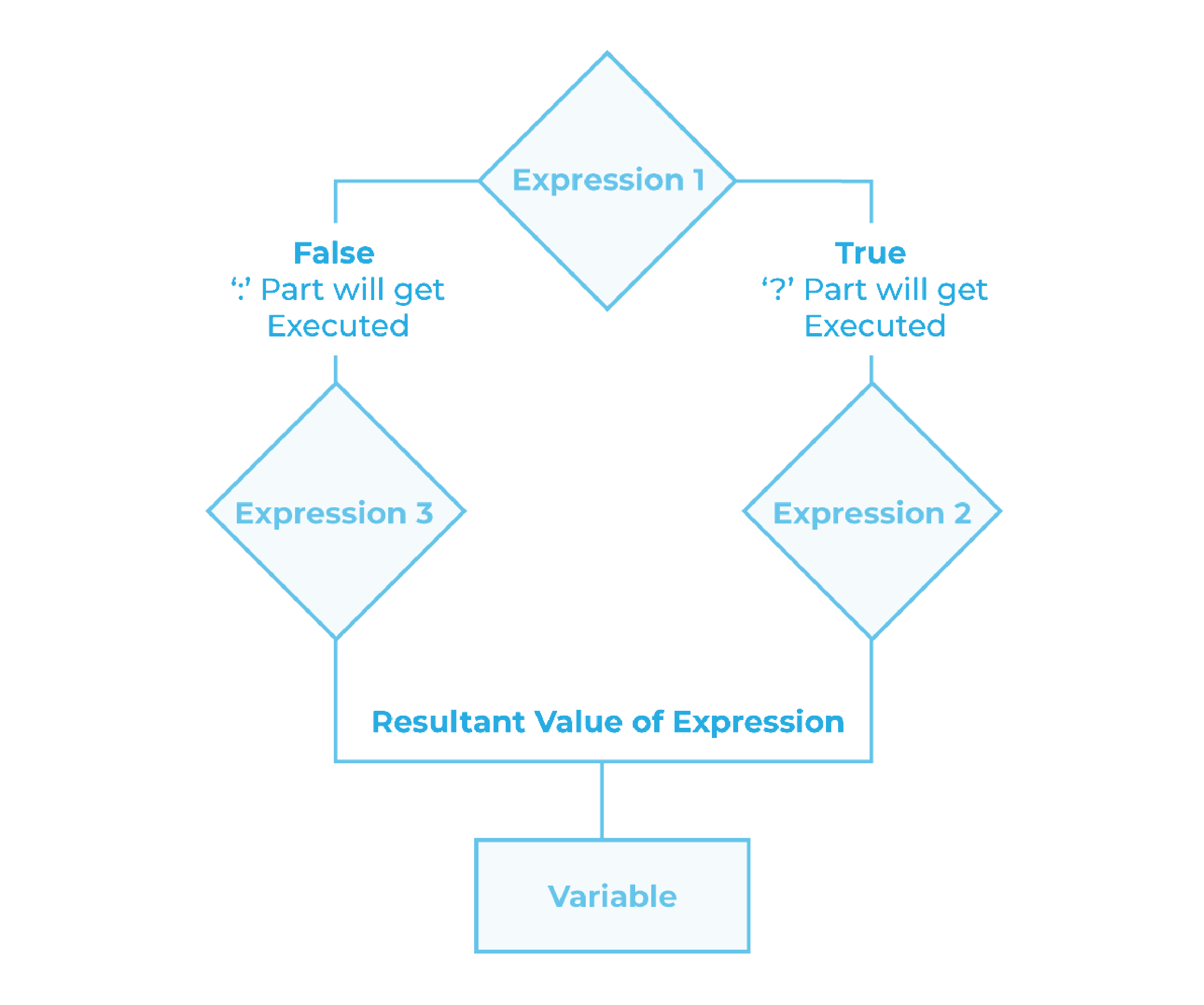The conditional operator in C programming language, as well as its syntax and operation, will be covered in this article. We’ll also see when the if-else condition should be used instead of the conditional operator. The only ternary operator in the C programming language is the conditional operator. If the "if else" has only one statement each, it can be used as an alternative to an if-else condition. The conditional operator takes an expression and, depending on whether it evaluates to true or false, either the first or second statement is executed.
What is a Conditional Operator In C?
You probably encountered this case once or more when you had to construct an if-else code in order to carry out a single statement. Yes, that is a bit of a hassle. For this issue, the conditional operator was created specifically. When compared to an if-else statement, which would require more than one line, the conditional operator allows you to express decision-making statements in just one line.
The conditional operator is a ternary operator since it requires three operands. Since the only ternary operator is the conditional operator in C programming language, the terms ternary operator and conditional operator are interchangeable when referring to this operator. Expressions, statements, constants, and variables can all be used as operands. They are appropriately called conditional operators because they always begin with a condition as the first operand.
Expression Syntax of Conditional Operator in C
expression ? statement1 : statement2Any value other than 0 will be regarded as true, and 0 will be seen as false, as the expression is being evaluated as a logical condition. Statements 1 and 2 may take the form of statements, expressions, variables, or constants. Depending on the outcome of the evaluation of the provided expression, one of the statements will be put into action.
Working for the Expression of Conditional Operator in C
The conditional operator of the C programming language works as follows:
- The result of the condition evaluation is implicitly changed to a bool once the condition is first evaluated.
- The first statement—the one following the question mark—will be executed if the condition evaluates to true.
- The second statement—the one that comes after the colon—is performed if the condition evaluates to be false.
- One of the two phrases included in the conditional operator’s result is the outcome of the conditional operator.
- The last two operands or expressions are simply ignored, with only one of them being evaluated. The diagram below will make it much easier for you to recall how the conditional operator in C operates.
Another Version of the Conditional Operator in C
For situations where the if statement would only contain one statement, the conditional operator is a condensed form of the if-else statement. Additionally, the conditional operator has a condensed form of itself. One of the most frequently used use cases in programming is the process of checking a condition and putting a value on a variable. This version of the conditional operator was created to assist with this process.
Syntax of the conditional operator in C
variable = condition ? value1: value2Working of the Conditional Operator in C
This conditional operator’s functionality is more similar to that of the original conditional operator. If the condition is found to be true, the compiler will first evaluate it and then assign value1 to the variable; if the condition is found to be false, value2 will be allocated to the variable.
The diagram below will make it much easier for you to recall how the conditional operator in C operates.
Some important remarks about the Conditional Operator
The conditional operator’s first operand should be an integral or a pointer type. The C compiler will implicitly convert the second and third operands to the same data type if they are not of the same type.
Associativity of the Conditional Operator in C
The operator’s operands are performed in the order specified by the Associativity property. When an expression contains several operators, and multiple operators share the same precedence, the execution order of the operators is determined by associativity.
The conditional operator is associative from right to left.
Difference between Conditional Operator in C and If-else Statement in C
The if-else statement and conditional operator in C are more comparable to one another. They virtually always carry out the same action: they check a condition and then make a statement based on the outcome of the condition’s evaluation. The conditional operator was created to make it easier for users to write code. If an if-else expression only has one statement to execute, the conditional operator can be used in that situation. The conditional operator helps programs write fewer lines of code.
The table below contains a list of some key distinctions between the conditional operator in C and the if-else expression in C
| Conditional operator in C | if-else statement in C |
|---|---|
| The conditional operator is a single programming statement and can only perform one operation. | The if-else statement is a block statement, you can group multiple statements using a parenthesis. |
| The conditional operator can return a value and so can be used for performing assignment operations. | The if-else statement does not return any value and cannot be used for assignment purposes. |
| The nested ternary operator is complex and hard to debug. | The nested if-else statement is easy to read and maintain. |
Examples of the Conditional operator in C
Let’s get started with some coding to illustrate some scenarios where the conditional operator may be quite useful because reading through all these theories can be tedious.
Print Whether the Given Number is Odd or Even
#include <stdio.h>
int main() {
int num = 13;
(num % 2 == 0)? printf("The given number is even") : printf("The given number is odd");
return 0;
}
Output
The given number is oddWorking
The first three lines of code are ones you are already used to. They read an integer input and initialize the variable num.
The second half of the sentence is executed because the condition 13% 2 == 1 evaluates to false in the first input, 13, which the conditional operator checks for first. The result then displays the string "The given number is odd."
Conclusion
We learned about the conditional operator in C, as well as its syntax, visual representation, and semantics, in this article. You can use assignment statements in a different way by using the conditional operator, which we also looked at. We looked at an example of how the conditional operator can be used to determine whether a given integer is odd or even.
Frequently Asked Questions (FAQs)
Q1. Is ++ a ternary operator?
Ans. No, ++ is not a ternary operator
Q2. Which is a logical operator?
Ans. A logical operator is a symbol or word used to connect two or more expressions such that the value of the compound expression produced depends only on that of the original expressions and on the meaning of the operator. Common logical operators include AND, OR, and NOT.
Q3. What is ternary vs binary operator?
Ans. The three categories of operators based on the number of operands they require are: Unary operators: which require one operand (Un) Binary operators: which require two operands (Bi) Ternary operators: which require three operands (Ter)
Q4. Why is it called a ternary operator?
Ans. The name ternary refers to the fact that the operator takes three operands. The condition is a boolean expression that evaluates to either true or false
Q5. What are the 5 logical operators?
Ans. Five logical operators are:
- Logical Negation.
- Logical Conjunction (AND)
- Logical Disjunction (Inclusive OR)
- Logical Implication (Conditional)
- Logical Biconditional (Double Implication)






